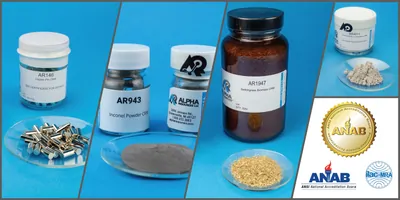
Kent Dyer is Alpha Resources’ Chief Chemist and has been with the company for more than 25 years. He is an engaged ASTM member with three active committee affiliations (E01 – Metals & Ores, D05 – Coal & Coke, D02- Petroleum) and has served as technical contact on several test methods. Holding a degree in chemistry from Sinclair College, Kent started his career in the chemistry field with an independent metallurgical testing lab and has been Ohio EPA-certified as a trace metals analyst.
Q: Is there a difference between analytical standards and certified reference materials (CRMs)?
A: A basic reference material is anything used as a comparative to differentiate items such as iron or copper. It satisfies basic needs and has little means for precision or uncertainty.
For example, a geologist identifying different types of rocks using a handheld X-ray analyzer would set up with a non-certified reference materials to identify the type of rock. It may not have an exact analysis, but enough to identify the different compositions as the geologist walks around an area and checks things out. The same analyzer might be used in a scrap yard to identify the difference between iron, aluminum, and other metals.
A CRM offers a more in-depth characterization of the material by providing one or more accepted test methods and an uncertainty of what’s being measured to a 95% confidence limit, with metrological traceability and/or traceability to a National Metrology Institute (NMI), such as NIST or other 17034 accredited references. Then, the material is certified by an accredited reference material producer. This certification will provide additional precision and trace elemental information that may be important.
Q: Why are CRMs important in spectrometry?
A: As industries evolve and change, there is an increasing need for a safety system and assurance that products are of good integrity. That demand for quality drives the requirement for CRMs to be used in more testing applications.
The benefits of a CRM begin with an unbroken chain of traceability. CRMs are based on a foundation of traceability, audits, and accreditation bodies that show the competence of the reference material producer who provides the most accurate and precise CRM. All of these are necessary to create confidence for an auditor and in a customer. The accuracy of reference materials is important to ensure that end-user materials meet specifications that can improve anything from safety and durability to reliability of the products they produce. The certified reference materials Alpha offers are used in many analyzers for this type of quality testing.
Q: What should lab managers look for in their CRM supplier?
A: One requirement is they must be accredited. Someone can create a reference material and claim it is a CRM, but only a company with an 17034 accreditation can produce the CRM under the strict guides accepted by auditors within industries.
To break down the different certifications used by standards producers, ISO 9001 acknowledges a company’s defined quality management system. An ISO 17025 accreditation addresses the quality management structure necessary for an accredited testing laboratory to provide data. An ISO 17034 accreditation serves as the quality management for a producing a CRM. Alpha Resources holds all three accreditations. Many standards producers with 17034 rely on outside labs certified in ISO 17025 for their data.
Founded in 1978, Alpha Resources, LLC is a global leader in the manufacture and distribution of aftermarket consumables and certified reference materials used in atomic spectroscopy analysis. Alpha Resources is ISO17034, ISO17025, ISO9001:2015 certified.














